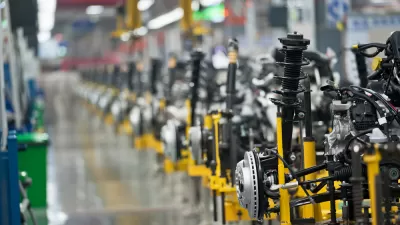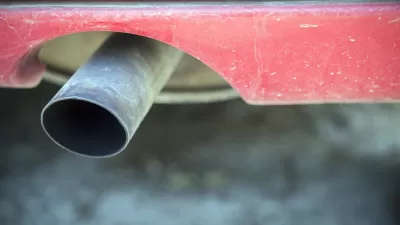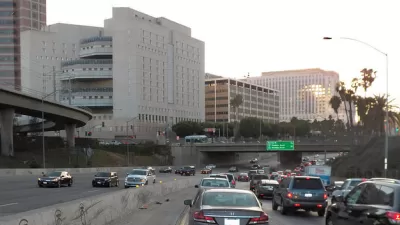The auto industry appears to be balking at supporting the Trump administration's plan to freeze vehicle emission standards at 2020 levels even though they initially asked Trump to loosen the rigorous Obama-era fuel efficiency rule that goes to 2026.

Last August, Transportation Secretary Elaine L. Chao and acting EPA Administrator Andrew Wheeler introduced the Safer Affordable Fuel-Efficient (SAFE) Vehicles Rule for Model Years 2021-2026. Freezing the standards at 2020 levels would amount to "the most environmentally significant regulatory rollback yet," according to a comprehensive analysis by the Rhodium Group.
"White House officials have launched an intense lobbying campaign as they seek to line up support for [the] proposal they hope to finalize this summer," report Juliet Eilperin Brady Dennis for The Washington Post. Chief among their targets is the automotive industry, which would appear to already be on their side based on their earlier position.
Auto companies asked Trump to reassess federal fuel efficiency standards within days of him taking office, a point administration officials raised during a Feb. 21 conference call and a meeting at the White House on Friday with representatives from Fiat Chrysler, Ford and General Motors.
“We’re doing it for you, we’re deregulating the sector for you,” is the way one senior administration official, who spoke on the condition of anonymity to discuss private conversations, put it. “We hope you get behind us.”
While the Post reporters did find that some auto representatives reacted positively to freezing the standards, e.g., "a Fiat spokesman said the company supports mileage targets 'based on market realities,' noting that gas prices are low and bigger vehicles remain popular with consumers," the industry group is reacting cautiously.
The Auto Alliance, whose members produce more than 70 percent of cars and light-duty trucks in the United States, has continued to voice concerns about the administration’s approach. Auto Alliance spokeswoman Gloria Bergquist said in an interview Thursday [March 7] that the group supports “year-over-year increases in fuel economy” and a nationwide standard that includes California and its affiliated states. Any regulation that fails to achieve that, she said, would lead to litigation and force firms to sell a different mix of vehicles in parts of the country.
Bergquist is referring to what are known as Section 177 (of the Clean Air Plan) or CARB (for California Air Resources Board) states: the 13 states and District of Columbia that have adopted California's Low-Emission Vehicle (LEV) standards and/or Zero Emission Vehicles (ZEV) program requirement, listed here by the Center for Climate and Energy Solutions, accounting for as much as 40 percent of all new light-duty vehicles sold in the United States
Calling for annual increases beyond 2020 is clearly not freezing the standards, which may account for the bolder headline in E&E News on Friday: "The rollback that automakers don't want." According to Maxine Joselow, "not one automaker has issued a statement of support" for the SAFE Rule.
One industry group not balking from supporting the SAFE Rule is the oil industry, particularly refineries, as posted earlier.
"Under the Trump administration's proposal, Americans will use 20 percent more gasoline per year by 2035, according to an analysis by Energy Innovation, a San Francisco-based energy and environmental policy firm," adds Joselow.
How did this happen?
In a March 6 opinion for Business Insider, Matthew DeBord explains how the auto industry's initial request to the Trump administration to weaken the Obama rule calling for 54.5 mpg by 2025 backfired, leading "to the present chaos, as California took a defiant stance toward a revocation of its waiver and the car companies realized that the administration was pushing beyond the earlier bargain."
Related in Planetizen:
-
White House Ends Talks with California Over Fuel Efficiency Standards, February 25, 2019
-
Who's Advocating Rolling Back Fuel Economy Standards? December 17, 2018
FULL STORY: White House presses automakers to back fuel-efficiency rollback

Alabama: Trump Terminates Settlements for Black Communities Harmed By Raw Sewage
Trump deemed the landmark civil rights agreement “illegal DEI and environmental justice policy.”

Study: Maui’s Plan to Convert Vacation Rentals to Long-Term Housing Could Cause Nearly $1 Billion Economic Loss
The plan would reduce visitor accommodation by 25% resulting in 1,900 jobs lost.

Planetizen Federal Action Tracker
A weekly monitor of how Trump’s orders and actions are impacting planners and planning in America.

Baltimore Ordered to Improve Sidewalk Accessibility
The city is one of many to face lawsuits for failing to comply with the Americans with Disabilities Act.

This Toronto Suburb Has More Bus Riders Than Columbus, Ohio
Brampton, Ontario used gradual improvements in service to prove that if you build it, they will ride.

Paris Bike Boom Leads to Steep Drop in Air Pollution
The French city’s air quality has improved dramatically in the past 20 years, coinciding with a growth in cycling.
Urban Design for Planners 1: Software Tools
This six-course series explores essential urban design concepts using open source software and equips planners with the tools they need to participate fully in the urban design process.
Planning for Universal Design
Learn the tools for implementing Universal Design in planning regulations.
Smith Gee Studio
Alamo Area Metropolitan Planning Organization
City of Santa Clarita
Institute for Housing and Urban Development Studies (IHS)
City of Grandview
Harvard GSD Executive Education
Toledo-Lucas County Plan Commissions
Salt Lake City
NYU Wagner Graduate School of Public Service




























